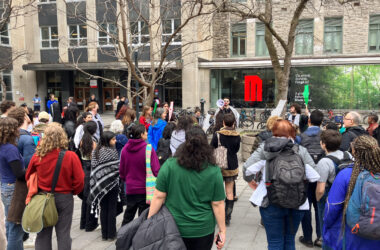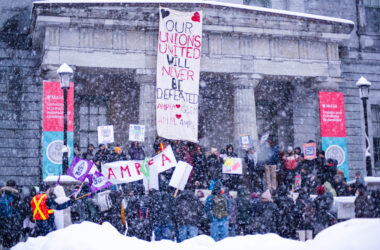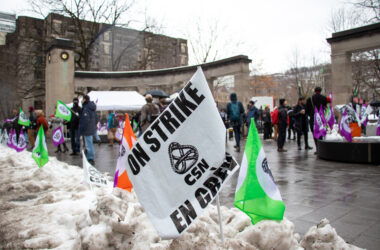 Logan Smith
Logan Smith Logan Smith
Logan SmithMcGill students joined Montreal residents to venture beyond the McGill Ghetto during Culture Shock Week, an event co-organized by the Quebec Public Interest Research Group and the Students’ Society that runs through October 15.
QPIRG, a student-run organization that focuses on research, action, and education on environmental and social justice issues, has weathered attacks over the past few weeks. The Opt-Out Campaign targeting QPIRG has shifted attention away from events like Culture Shock, explained Andrea Figueroa, QPIRG’s external coordinator.
Reprising its role as an advocate for marginalized communities for a fifth year in a row, Culture Shock hosts a series of events designed to debunk myths about refugee, indigenous, and immigrant communities.
This year, the theme is community building, while last year’s organizers sought to promote greater student engagement. Nevertheless, increased student attendance at workshops and panel discussions remain a top priority for organizers.
“Students often find themselves caught in the university setting because midterms and assignments take precedence, and part of what Culture Shock is about is connecting people to the realities of Montreal by bringing it to McGill,” Figueroa said. “Now you can go during lunch to our workshop about racism, or go after class to a panel about migration.”
Last week featured a panel discussion led by journalists and community organizers Jordan Flaherty, Jesse Muhammad, and Victoria Law, who embarked on a “Community and Resistance” tour that aims to connect grassroots activists and independent media, as well as to refocus attention on justice and liberation struggles.
“We’re trying to find positive ways that communities empower themselves and create change, despite the realities of racism and oppression,” Figueroa said. “We need to ask whose voices we’re listening to and why.”
Culture Shock aims to amplify the voices of the underprivileged or marginalized segments of society.
“The idea of balance or neutrality doesn’t really exist, because a lot of voices are never heard,” Figueroa said.
“Part of it is about giving a voice to people from these groups and challenging what you hear,” added Lydia Oulid Brahim, a Culture Shock coordinator.
Culture Shock owes its origins to Culture Fest, an event on campus that celebrated multiculturalism. Over time, it has grown to host a wide variety of speakers.
This week, the event will explore the range of strategies used by LGBT communities to get involved with or to critique the mainstream gay agenda through a panel discussion titled “Resisting the Neoliberal Gay Agenda: Queer Organizing in an International Context” on October 13. The discussion will showcase Ponni Arasu, who will speak about her experience working in India with different queer collectives.
“The speakers for this event also find themselves subject to multiple channels of discrimination,” said Figueroa. “We look at how different struggles intersect. Our panelists are people of colour and who are migrants.”
Local issues will also be brought into focus this week, with a workshop titled, “Racism in Canada” which taps into the experiences of indigenous communities and examines racial profiling and Islamophobia. Leading this workshop is Robyn Maynard, who has written on racial profiling, police violence, and migrant justice.
The experience of organizing Culture Shock has enabled Figueroa to further conside the notion of “community.” The existence of a community within the borders of McGill’s campus is difficult for Figueroa to envision because students experience things differently as a function of their race, nationality, or privileges.
“Part of being in a community is viewing things similarly and how you approach things in the world,” she said.
Emily Clare, SSMU’s equity commissioner, whose role is to address and reach out to students who have been harassed or discriminated against, argued that a sense of community still exists at McGill in the midst of its diversity.
“I think when you speak about community, you can’t try and homogenize everyone. I think communities thrive through differences,” said Clare.
According to Figueroa, the success of Culture Shock cannot be measured in the numbers it attracts.
“Even if one person comes out of culture shock thinking differently about race, migration and multiculturalism, I would find that a success.








